
Dans le cadre du semestre thématique 2014 du Centre Henri Lebesgue une conférence sur les espaces des lacets en géométrie et topologie est organisée au laboratoire de mathématiques Jean Leray du 1er au 5 septembre 2014 et pris en charge par le programme Geanpyl.
Nous pensons que le moment est propice pour rassembler des experts et des jeunes mathématiciens travaillant dans ces domaines. Nous nous attendons à de nombreuses interactions qui, nous l'espérons, pourront être une source d'inspiration pour de nouvelles idées. Dans cette optique, le programme de la conférence comprend cinq mini-cours destinés à un public de non-spécialistes, ainsi que plusieurs exposés portant sur des développements plus pointus.
Le programme de la conférence comprend cinq mini-cours destinés à un public de non-spécialistes, ainsi que plusieurs exposés portant sur des développements plus pointus.
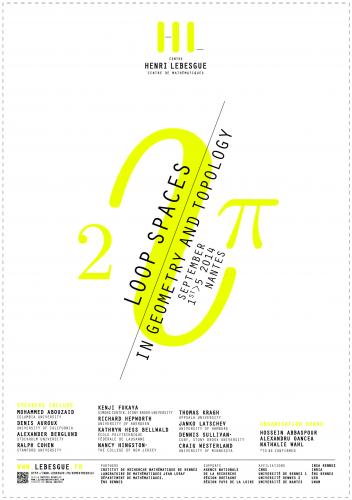
Mini-cours :
- Mohammed Abouzaid (Columbia Univ, New York)
- Kenji Fukaya (Simons Center, Stony Brook)
- Nancy Hingston (The College of New Jersey)
- Kathryn Hess Bellwald (École Polytechnique Fédérale de Lausanne)
- Richard Hepworth (University of Aberdeen)
Conférénciers :
- Denis Auroux (University of California, Berkeley)
- Somnath Basu (SUNY, Binghamton)
- Alexander Berglund (Stockholm University)
- Ralph Cohen (Stanford University)
- Thomas Kragh (Uppsala University)
- Janko Latschev (University of Hamburg)
- Dennis Sullivan (CUNY, New York/SUNY, Stony Brook)
- Craig Westerland (Univ. of Minnesota, Twin cities)
Organisateurs : Hossein Abbaspour (Nantes), Alexandru Oancea (Paris), Nathalie Wahl (Copenhague)Dans le cadre du semestre thématique 2014 du Centre Henri Lebesgue une conférence sur les espaces des lacets en géométrie et topologie est organisée au laboratoire de mathématiques Jean Leray du 1er au 5 septembre 2014 et pris en charge par le programme Geanpyl. Nous pensons que le moment est propice pour rassembler des experts et des jeunes mathématiciens travaillant dans ces domaines. Nous nous attendons à de nombreuses interactions qui, nous l'espérons, pourront être une source d'inspiration pour de nouvelles idées. Dans cette optique, le programme de la conférence comprend cinq mini-cours destinés à un public de non-spécialistes, ainsi que plusieurs exposés portant sur des développements plus pointus.
Le programme de la conférence comprend cinq mini-cours destinés à un public de non-spécialistes, ainsi que plusieurs exposés portant sur des développements plus pointus.
Mini-cours :
- Mohammed Abouzaid (Columbia Univ, New York)
- Kenji Fukaya (Simons Center, Stony Brook)
- Nancy Hingston (The College of New Jersey)
- Kathryn Hess Bellwald (École Polytechnique Fédérale de Lausanne)
- Richard Hepworth (University of Aberdeen)
Conférénciers :
- Denis Auroux (University of California, Berkeley)
- Somnath Basu (SUNY, Binghamton)
- Alexander Berglund (Stockholm University)
- Ralph Cohen (Stanford University)
- Thomas Kragh (Uppsala University)
- Janko Latschev (University of Hamburg)
- Dennis Sullivan (CUNY, New York/SUNY, Stony Brook)
- Craig Westerland (Univ. of Minnesota, Twin cities)
Organisateurs : Hossein Abbaspour (Nantes), Alexandru Oancea (Paris), Nathalie Wahl (Copenhague)
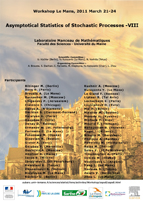 Statistique Asymptotique des Processus Stochastiques VIII
Statistique Asymptotique des Processus Stochastiques VIII
Lien vers l'affiche : affiche_ASSP8.pdf (302.36 Ko)
Université du Maine, Le Mans, 21-24 March, 2011
Sponsors: Université du Maine, FR 2962 du CNRS Mathématiques des Pays de Loire, CUM, Ministère de l'Education nationale, Conseil Général de la Sarthe and Conseil Régional des Pays de la Loire
The purpose of this workshop is to stimulate research in statistical inference for continuous time stochastic processes. This branch of mathematical statistics attracts more and more attention of the statisticians and probabilists because first: the real systems are often well described by the continuous time mathematical models (point processes, diffusion processes, stochastic differential equations with partial derivatives, stable processes etc.) and the second: the diversity of the models and the diversity of the statements of the statistical problems make these models quite attractive for the mathematicians because all these allow to obtain many new results which sometimes have no analogue in discrete time models. Note that solutions obtained for continuous time models can be valid for discrete schemes of observation too. The computer realizations of the statistical algorithms (real data applications) requires that a special attention have to be payed to the effects due to discretization of continuous-time trajectories. Therefore, we wait that one (important) part of the talks will be devoted to statistical inference for discrete time observations (of continuous time systems).
Scientific Programme Committee: U. Küchler, Yu. Kutoyants, N. Yoshida.
Kaehler geometry builds on classical algebraic geometry, complex analysis and symplectic geometry, producing new means of study for complex manifolds.
We are bringing together mathematicians working in various domains of geometry to focus on recent advances in complex and Kaehler geometry and to celebrate F. A. Bogomolov's 65-th birthday in Nantes.
Affiche : posterBogomolov.pdf (197.15 Ko)
Organising committee:
Informations et inscriptions sur le site
Contact: gecoal2012@univ-nantes.fr
Accueil et conférences : UFR Sciences et Techniques de Nantes - Bâtiment 2 Amphi Pasteur
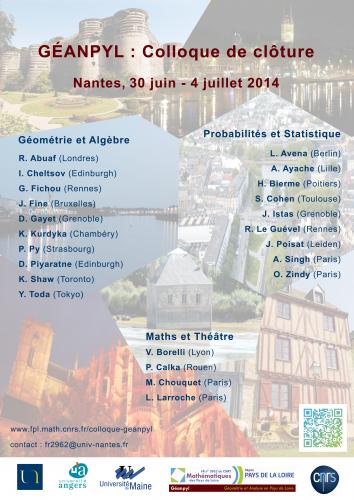
PROGRAMME
Titres et résumés
Mathématiques et Théâtre (mercredi 2 juillet 2014)
INSCRIPTION-REGISTRATION : les inscriptions sont closes.
Lancé en 2010 avec le soutien financier de la Région Pays de la Loire le programme Géanpyl coordonné par la Fédération de recherche Mathématiques des Pays de Loire a permis la réalisation de multiples actions de recherche : séjours de chercheurs étrangers pour des collaborations avec un chercheur ligérien, organisation de colloques internationaux, enrichissement des fonds documentaires spécialisés, actions variées vers le public et la société.
Du 30 juin au 4 juillet, Géanpyl tiendra son colloque de clôture à Nantes, accueilli par le Laboratoire de mathématiques Jean Leray sur le campus de la Lombarderie. Rassemblant les divers acteurs du programme Géanpyl, ce colloque apportera des éclairages sur trois axes majeurs, riches d'activités impulsées par le programme Géanpyl.
Les deux premiers jours seront consacrés à diverses questions de géométrie (géométrie birationnelle, catégories dérivées, géométrie algébrique réelle, géométrie tropicale, géométrie différentielle, analyse géométrique), alors que les deux derniers jours porteront sur des thèmes stochastiques (marche aléatoire en milieu aléatoire, statistique des processus, processus fractionnaire). Ouvert à un large public, le mercredi sera la journée de croisements entre des exposés de mathématiciens (très jeunes avec des participants Math en jeans et moins jeunes), un montage théâtral avec les Ateliers du spectacle (Paris) et des vidéos réalisées avec des élèves d'écoles et lycées et la compagnie Athenor (Nantes/Saint-Nazaire).
Ce colloque de clôture mettra en évidence les apports du programme Géanpyl : un bouillonnement mathématique renforcé dans les trois laboratoires de mathématiques de Angers, Le Mans et Nantes, un rayonnement international consolidé avec des rencontres scientifiques de haut niveau, la présence incontournable des mathématiques dans notre quotidien et notre culture, la diffusion des savoirs et le partage du goût pour les mathématiques par les élèves d'écoles, de lycées et les étudiants.
Rendez-vous à Nantes, avec les mathématiciens d'Angers, Le Mans et Nantes, pour évoquer des travaux menés quatre années durant dans le cadre du programme Géanpyl et partager nos projets d'avenir.
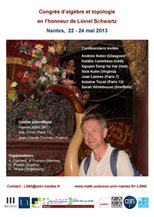 Congrès d'algèbre et topologie à l'occasion du soixantième anniversaire de Lionel Schwartz - Du 22 au 24 mai 2013 à Nantes (premier exposé à 14h le mercredi 22 mai).
Congrès d'algèbre et topologie à l'occasion du soixantième anniversaire de Lionel Schwartz - Du 22 au 24 mai 2013 à Nantes (premier exposé à 14h le mercredi 22 mai).
Toutes les informations seront disponibles sur le site internet du congrès :
Conférenciers invités:
Les participants souhaitant proposer un exposé doivent envoyer un titre et un résumé avant le 31 mars 2013.
Comité scientifique :
Les organisateurs :
Contact : LS60@univ-nantes.fr
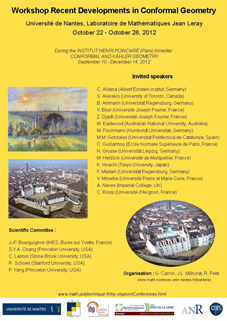
Dans le cadre du programme ANR Aspects Conformes de la Géométrie (ACG) est organisé un trimestre Conformal and Kähler Geometry à l'Institut Henri Poincaré Paris du 10 Septembre au 14 Décembre 2012. Ce workshop fait partie du trimestre et se tiendra à l'Université de Nantes du 22 au 26 Octobre 2012, au laboratoire de mathématiques Jean Leray.
![]() Plus d'informations sur le site
Plus d'informations sur le site
![]() Conférenciers invités :
Conférenciers invités :
C. Aldana (Albert Einstein Institut, Germany, Germany)
S. Alexakis (University of Toronto, Canada)
B. Ammann (Universität Regensburg, Germany)
V. Bour (Université Joseph Fourier, France)
Z. Djadli (Université Joseph Fourier, France)
M. Eastwood (Australian National University, Australia)
M. Fischmann (Humboldt Univeristät, Germany)
M.M. Gonzales (Universitat Politècnica de Catalunya, Spain)
C. Guillarmou (École Normale Supérieure de Paris, France)
N. Grosse (Universität Leipzig, Germany)
M. Herzlich (Université de Montpellier, France)
K. Hirachi (Tokyo University, Japan)
F. Madani (Universität Regensburg, Germany)
V. Minerbe (Université Pierre et Marie Curie, France)
A. Neves (Imperial College, UK)
C. Rossi (Université d'Avignon, France)
![]() Organisation : Gilles Carron, Jean-Louis Milhorat, Robert Petit.
Organisation : Gilles Carron, Jean-Louis Milhorat, Robert Petit.
![]() Venir au Laboratoire Jean Leray : voir le lien Venue
Venir au Laboratoire Jean Leray : voir le lien Venue
![]() Hébergements : Liste d'hôtels et appartements à Nantes sélectionnés pour le colloque.
Hébergements : Liste d'hôtels et appartements à Nantes sélectionnés pour le colloque.
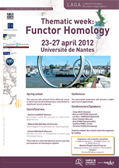
Les foncteurs interviennent dans la compréhension de phénomènes variés en algèbre, en homotopie ou en théorie des représentations. Le point de vue fonctoriel apporte à chaque fois une vision différente et des méthodes complémentaires, qui permettent de s'attaquer à des problèmes mathématiques difficiles.
Pour l'école de printemps, trois cours seront proposés :
A. DJAMENT (Nantes) Homologie stable des groupes à coefficients polynomiaux
W. van der KALLEN (Utrecht) Cohomological finite generation for reductive groups
R. MIKHAILOV (Moscou) Derived functors of nonadditive functors and homotopy theory
ainsi que deux séances présentant les prérequis nécessaires.
Certains développements en cours seront présentés lors du mini-congrès qui se déroulera conjointement, avec pour orateurs confirmés :
L'emploi du temps prévisionnel est consultable ici.
Les organisateurs : Vincent Franjou (Nantes), Lionel Schwartz et Antoine Touzé (Paris 13)
Contact: Foncteur2012@univ-nantes.fr
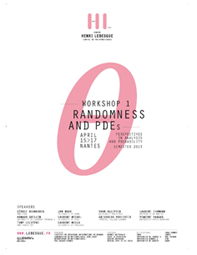 Workshop 1: Randomness and Partial Differential Equations
Workshop 1: Randomness and Partial Differential Equations
Ce workshop est organisé par le Centre de mathématiques Henri Lebesgue dans le cadre de son semestre 2013 Perspectives in Analysis and Probability".
Cet atelier se déroulera au Laboratoire de Mathématiques Jean Leray à Nantes avec le soutien financier partiel de la Région des Pays de la Loire à travers son programme Géanpyl.
Dates: Monday 15 to Wednesday 17 April 2013
Contact: Ph. Carmona, F. Hérau
Affiche : Aff_Workshop1.pdf (27.58 Ko)
List of (confirmed) speakers
Cédric Bernardin, ÉNS Lyon Arnaud Guillin, Université de Clermont-Ferrand Tony Lelièvre, ÉNPC-Paris Est Jan Maas, University of Bonn Laurent Michel, Université of Nice Laurent Miclo, Université of Toulouse Yann Ollivier, Université Paris-Sud Grigorios Pavliotis, Imperial College Londres Laurent Thomann, Université de Nantes Vincent Vargas, Université Paris Dauphine
 À l'occasion de la venue de Sergueï Novikov, un atelier de Topologie aura lieu le dimanche 6 juillet 2008 pm et le lundi 7 juillet tout la journée au laboratoire de Mathématiques Jean Leray à l'Université des sciences de Nantes.
À l'occasion de la venue de Sergueï Novikov, un atelier de Topologie aura lieu le dimanche 6 juillet 2008 pm et le lundi 7 juillet tout la journée au laboratoire de Mathématiques Jean Leray à l'Université des sciences de Nantes.
La conférence de Novikov sera dans le cadre d'un colloquium le lundi 7 juillet 2008 à 15h, salle de séminaire.
Discrete $GL_n$ Connections and New Discretization of Complex Analysis
A few years ago new ideas were developped. How to discretize \emph{Diff-geometrical connections}? How to discretize \emph{Complex analysis}?
Our discretization is different from the classical one made for the square lattice. It is based on the ideas borrowed from the theory of completely integrable systems. We are using some remarkable properties of the equilateral triangle lattice in the euclidean plane. At the moment we are working on the extension of these ideas to the equilateral triangle lattice on the hyperbolic (Lobachevsky) plane.
Organisateur : Mr François Laudenbach, du Laboratoire Jean Leray.
 Lien du site web http://www.math.sciences.univ-nantes.fr/MMCE09/?q=node/2)
Lien du site web http://www.math.sciences.univ-nantes.fr/MMCE09/?q=node/2)
The conference will take place: June 8th-9th in Nantes.
The goal of this meeting is to gather mathematicians working in the field of modelisation, analysis, approximation, numerical analysis and scientific computing applied to electrocardiology.
Organisation :
During 2 days, a dozen of international researchers will present their work. 20 min talks reserved for Ph-D students will also be scheduled. A financial support may be granted for participating students.
Even though this conference is mainly run by mathematicians, there is a strong will of opening towards the concerned fields of biology and medical imaging, especially towards researchers and students who work on the interface between these fields and wish to strengthen their knowledge.
The first day (june 8th) is part of "Les journées scientifiques de l'université de Nantes", an annual event regrouping conferences and other scientific activities around research fields of interest in the university of Nantes.
Scientific comitee
* Y. Bourgault, Université d'Ottawa
* Y. Coudière, Université de Nantes
* M. Thiriet, Université Paris 6 et Inria
* M. Saad, Ecole Centrale de Nantes
* R. Turpault, Université de Nantes
Organisation
Y. Coudière, F. Jauberteau and R. Turpault - Université de Nantes